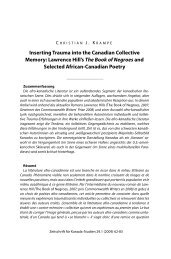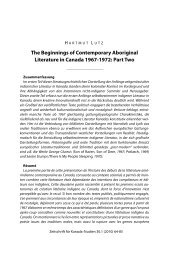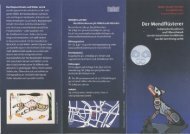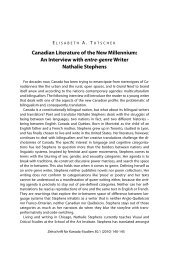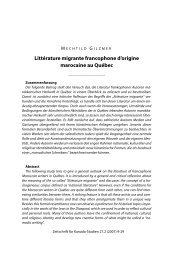The Gradual Instant: An Interview with Anne Michaels
The Gradual Instant: An Interview with Anne Michaels
The Gradual Instant: An Interview with Anne Michaels
You also want an ePaper? Increase the reach of your titles
YUMPU automatically turns print PDFs into web optimized ePapers that Google loves.
154 Gordon Bölling<br />
AM: I am very conscious of writing in a way that allows the reader a place in the<br />
book. I want the reader to come into the book. <strong>The</strong> whole way the book is structured<br />
is for the reader to come into the book. It’s like an actor on stage who knows<br />
that the best way to get the audience’s attention is not to shout at them; the best<br />
way is to whisper. <strong>The</strong>n the audience comes forward to see what’s happening. In a<br />
similar way, I want the reader to move closer and go into the book. Looking at large<br />
ideas, large questions, there always has to be a feeling attached to it. It can’t be an<br />
abstract notion, so the combination of thinking and feeling is really important to<br />
me.<br />
GB: Your second novel, <strong>The</strong> Winter Vault, will come out later this month. When did<br />
you begin work on this book and how did it originate?<br />
AM: I started working on this one even before the other book was published. It<br />
originated, again, from a number of questions and a very powerful image. If you<br />
haven’t read the book, it’s hard to explain. <strong>The</strong> opening scene takes place at the site<br />
of a temple which is being dismantled because a huge dam is being built, the Aswan<br />
Dam, which will flood the entire area. <strong>An</strong>d so they’re saving the temple by<br />
taking it apart and they are going to reerect it higher up. But in taking it apart and in<br />
putting it together, something crucial is being lost. So there is a scene between two<br />
characters at the site of that temple and that opening image is what brought everything<br />
together.<br />
GB: Like Fugitive Pieces, <strong>The</strong> Winter Vault takes its readers to a number of very different<br />
countries. Your new novel covers a time span of several decades and is set in<br />
Canada as well as in England, Egypt, and Poland. How difficult is it to capture all of<br />
these times and places in a single book?<br />
AM: It’s difficult. Also because I’m not interested in comparison, I’m interested in<br />
connection. It’s easy to compare things, it’s not so easy to understand what really<br />
connects things. For me, it’s a great challenge and a pleasure to begin to understand<br />
the connections between things that might seem superficially not to be connected.<br />
GB: In your novels as well as in your poetry you easily transcend an exclusive focus<br />
on Canadian subject matters and themes and instead move on to larger international<br />
or even universal narratives. This, of course, holds true for a number of contemporary<br />
Canadian writers. <strong>The</strong> works of <strong>An</strong>ne Carson, Michael Ondaatje, and<br />
Rohinton Mistry come to mind. How important is this transgression of national<br />
boundaries for you?<br />
AM: It’s essential. Certainly we live in a time when our consciousness of the world<br />
is inseparable from our everyday life. So it would seem very unnatural to me to<br />
ghettoize experience that way. Even the most intimately nationalistic event, for<br />
example the Cypress Hills Massacre, I think, has larger connections. [<strong>The</strong> Cypress<br />
Hills Massacre of 1873 is at the center of Guy Vanderhaeghe’s award-winning novel<br />
<strong>The</strong> Englishman’s Boy (1996).]



